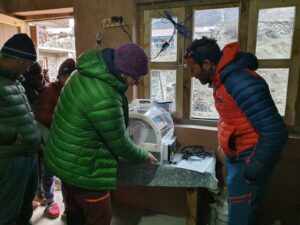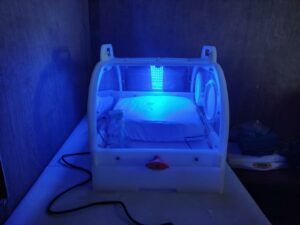Everyone, absolutely everyone, needs help at some point in their lives. Throughout my existence I have had the pleasure of meeting many people, each with their own story. Very hard stories. Stories that make you think. I promise you, that many of these testimonies have given me goosebumps, and have made me shed more than one tear… I am not exaggerating. As much as I want to, I can’t even imagine what many of them have gone through. Thanks to everything I have seen and heard, I have realized how important it is to help, to collaborate, because with very little, we can change everything.
So, after reaching the top of Manaslu and a few days of rest in Kathmandu -although to tell the truth, we slept little, but we did recover from the great effort we had made-, we decided to return to the Base Camp to meet again with the residents of Samagaun. These people always made us feel very welcome and lend us a hand seems to me the least we can do.
On our return to the CB of Manaslu we were lucky to be in very good company, with friends. Specifically, among our group of 13 friends, there were 7 sanitarians (2 doctors and 5 nurses). During their stay they have been seeing patients and among all of us we have acquired some materials that are so useful to the local population. Medication, hygiene products… and two thermal beds. Yes, yes, you read that right… thermal beds, that is, some portable incubators that we have installed in Okjaldhunga Patle and Samagaun. Amazing.
Said like that, it sounds a bit strange, but I will put you in context. It is well known that technology is the key in terms of health advances, but unfortunately, it is very expensive, and therefore it is far from the economic possibilities of developing countries. What’s more, among all those stories that I have told you before, there was one that stuck in my mind. Noa, a 33-year-old Nepali woman, told me with tears in her eyes that, in her village, premature babies fit into a shoebox or an empty pumpkin… Really sad. A shoebox or a pumpkin… that is for them what we know here as a conventional incubator, whose price can go up to 60,000 euros.

In the face of this reality, two young engineers from ” Medicina abierta al mundo” set out and developed an accessible, open source and low-cost neonatal crib. Their work consists, among other things, of creating microchips that are implanted in the crib and with which they generate optimal humidity, light, oxygen and temperature conditions so that when the baby is born they can rest in ideal conditions. And believe me, in these remote rural areas, having these resources, especially in winter, can save (many) lives…
But here comes the best… This crib is foldable, has the size of a suitcase, weighs approximately 23 kilos and costs around 350 euros… The forerunners of this invention, convinced that the place of birth should not condition the possibilities of a newborn to get ahead, they have used simple materials and technologies so that it can be acquired and replicated anywhere in the world. In fact, if something goes wrong, an engineer can connect from Spain with the incubator’s microchip and fix breakdowns and technical problems online. What’s more, all the design and assembly information is shared on the internet so that whoever may need this product can manufacture it by their own means. Really, an invention!
But the merit is not his alone. Together with the NGO “Ayuda a contenedores” (which financially manage the project), and “Salesianos Pamplona” (who collaborate by designing the material through a 3D machine) they form the perfect trio. A trio that contributes their time and knowledge altruistically and that make possible this great project that continues to grow and save the lives of the little ones.
It is because of people like these that I still have faith in the human being… I think there are no words in the world to thank you for your work. And it is not easy to find people whose purpose is not to manufacture and sell, but to create and share their knowledge altruistically with the sole purpose of saving lives.
I promise, there is no money in the world that pays for those smiles, those looks of satisfaction and gratitude that the Nepalese families have given us when we have delivered all this material. That is the best memory that I take from this trip, without a doubt. An image that will always stay in my retina.

